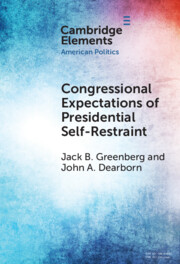Refine search
Actions for selected content:
24 results
Participatory unilateralism: understanding Congress’s role in presidential unilateral policymaking
-
- Journal:
- Political Science Research and Methods , First View
- Published online by Cambridge University Press:
- 16 December 2025, pp. 1-18
-
- Article
-
- You have access
- Open access
- HTML
- Export citation
The Unconstrained Future of World Order: The Assault on Democratic Constraint and Implications for US Global Leadership
-
- Journal:
- International Organization / Volume 79 / Issue S1 / December 2025
- Published online by Cambridge University Press:
- 20 November 2025, pp. S71-S87
- Print publication:
- December 2025
-
- Article
-
- You have access
- Open access
- HTML
- Export citation

Congressional Expectations of Presidential Self-Restraint
-
- Published online:
- 15 April 2025
- Print publication:
- 22 May 2025
-
- Element
- Export citation

The Cambridge Companion to US First Ladies
-
- Published online:
- 02 January 2025
- Print publication:
- 06 February 2025
21 - Better Late than Never
- from Part III - Diplomacy
-
- Book:
- Five Times Faster
- Published online:
- 24 October 2024
- Print publication:
- 07 November 2024, pp 278-283
-
- Chapter
- Export citation
Public Responses to Unilateral Policymaking
-
- Journal:
- Journal of Experimental Political Science / Volume 12 / Issue 1 / Spring 2025
- Published online by Cambridge University Press:
- 02 April 2024, pp. 86-98
-
- Article
-
- You have access
- Open access
- HTML
- Export citation
Executive action that lasts
-
- Journal:
- Journal of Public Policy / Volume 44 / Issue 2 / June 2024
- Published online by Cambridge University Press:
- 10 January 2024, pp. 344-365
-
- Article
-
- You have access
- Open access
- HTML
- Export citation
1 - Raising Questions
-
- Book:
- Why the Electoral College Is Bad for America
- Published online:
- 09 November 2023
- Print publication:
- 23 November 2023, pp 1-17
-
- Chapter
- Export citation
2 - How the Electoral College Works
-
- Book:
- Why the Electoral College Is Bad for America
- Published online:
- 09 November 2023
- Print publication:
- 23 November 2023, pp 18-44
-
- Chapter
- Export citation

LBJ's America
- The Life and Legacies of Lyndon Baines Johnson
-
- Published online:
- 19 October 2023
- Print publication:
- 19 October 2023
5 - Elected Institutions
-
- Book:
- Righteous Politics
- Published online:
- 10 August 2023
- Print publication:
- 17 August 2023, pp 106-130
-
- Chapter
- Export citation
21 - Better Late Than Never
- from Part III - Diplomacy
-
- Book:
- Five Times Faster
- Published online:
- 19 March 2023
- Print publication:
- 06 April 2023, pp 231-235
-
- Chapter
- Export citation
13 - The President’s Two Bodies
- from Part V - Executive and Administrative Constitutionalism in Effective Democratic Government
-
-
- Book:
- Constitutionalism and a Right to Effective Government?
- Published online:
- 20 October 2022
- Print publication:
- 27 October 2022, pp 167-178
-
- Chapter
- Export citation
7 - The Drive for a National Popular Vote for the Presidency: A Case Study in Amending the Unwritten Constitution
-
-
- Book:
- Amending America's Unwritten Constitution
- Published online:
- 13 October 2022
- Print publication:
- 20 October 2022, pp 147-168
-
- Chapter
- Export citation
1 - Base
- from Part I - Trump’s Tribe
-
- Book:
- The Enablers
- Published online:
- 03 September 2021
- Print publication:
- 19 August 2021, pp 19-35
-
- Chapter
- Export citation
8 - Group Empathy in the Era of Trump
-
- Book:
- Seeing Us in Them
- Published online:
- 11 March 2021
- Print publication:
- 18 March 2021, pp 166-211
-
- Chapter
- Export citation
Presidential directives in a resistant bureaucracy
-
- Journal:
- Journal of Public Policy / Volume 41 / Issue 4 / December 2021
- Published online by Cambridge University Press:
- 15 October 2020, pp. 776-797
-
- Article
- Export citation
11 - Structure and Administration of the Court
-
- Book:
- An Introduction to the International Criminal Court
- Published online:
- 09 June 2020
- Print publication:
- 02 July 2020, pp 380-420
-
- Chapter
- Export citation
Revisiting McGovern-Fraser: Party Nationalization and the Rhetoric of Reform
-
- Journal:
- Journal of Policy History / Volume 32 / Issue 1 / January 2020
- Published online by Cambridge University Press:
- 30 January 2020, pp. 1-24
-
- Article
- Export citation

In the Shadow of the Cold War
- American Foreign Policy from George Bush Sr. to Donald Trump
-
- Published online:
- 08 November 2019
- Print publication:
- 05 December 2019
